Greetings from your Texas Capitol! It’s a busy time for us here at the statehouse in Austin. The Senate Finance Committee is actively working on the 2024-25 biennial state budget, the Senate Business and Commerce Committee has started hearings continuing their interim talks about the grid and Texas electricity market design, and legislators are actively filing new bills each day. We’ll get into all of that and more in this edition of our Capitol Update.
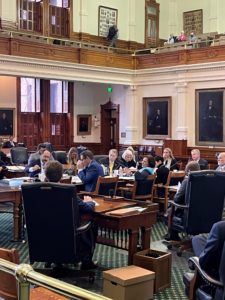
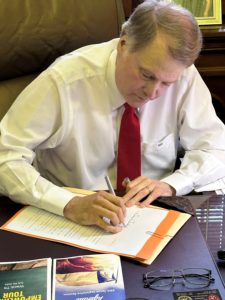
Listening in on the first Business & Commerce Committee Signing our first several Senate Bills and Joint
hearing for the session on 2/7/23. Resolutions before filling.
Newly Authored Legislation
Thus far, I have filed twelve pieces of legislation and I will file several more in the coming weeks. The bill-filing deadline for both the House and Senate is March 10th. I am continuing to work on my priority legislation and expect to file those bills shortly. I will have a detailed explanation of those bills in the capitol update after filing. For now, here are highlights of the legislation I have already filed and all can be found online here:
SJR 35: Proposes a constitutional amendment clarifying that non-citizens of the United States may not vote in any election within the State of Texas. Should this bill affirmatively pass the legislature, the proposed constitutional amendment shall be submitted to Texas voters as a ballot proposition, in November of this year
SJR 36: In 2017, the Texas Legislature passed SJR 2 which formally called for a convention of the states under Article V of the United States constitution with a specific focus on imposing fiscal restraints on the federal government, limiting the power and jurisdiction of the federal government, and limiting the terms of office of federal officials and members of Congress. SJR 38 was also passed in the same session, which issued a call for a convention of the states with an established expiration date of eight years. My resolution for this session, SJR 36, eliminates the sunset date on the State of Texas’s call for a convention of the states.
SB 598: Currently in statute, if the perpetrator did not have a prior romantic relationship with the victim, the penalty for aggravated assault resulting in paralysis or a persistent vegetative state is a second degree felony. Due to the severity of the injury, the romantic status should not be a factor in determining the penalty. SB 598 increases the penalty for aggravated assault from a second degree felony to a first degree felony if the assault causes a persistent vegetative state or irreversible paralysis, regardless of romantic relationship. Pleased to file this companion bill with Rep. Shelby Slawson.
SB 599: Under current statute, individuals with certain occupations such as state and federal judges and active judicial officers are allowed to carry a concealed firearm in a courthouse. SB 599 would add district clerks to the list of these individuals who can conceal carry into the courthouse.
SB 600: Currently, individuals found guilty of human smuggling may face as little as two years of imprisonment. Human smugglers often target and exploit illegal immigrants along the smuggling journey and subject them to dangerous situations that has resulted in hundreds of deaths. Texas reached a record number of illegal immigrant apprehensions in fiscal year 2022, with over 1 million apprehensions in Texas Sectors. This massive movement of over 1 million illegal immigrants at the Texas-Mexico border was carried out by human smuggling organizations and the Mexican cartels, who control, facilitate, or benefit from human smuggling activity. SB 600 amends current law to increase the minimum term of imprisonment from two to five years for the criminal offenses of smuggling of persons and continuous smuggling of persons.
SB 601: Texas State Technical College (TSTC) is a co-educational two-year institution of higher education offering courses of study in technical vocational education for which there is high demand within the State of Texas. TSTC operates ten campuses in Texas. Under Section 135.02 of the Education Code, campus locations are confined to specific cities within identified counties. Currently, TSTC’s Red Oak campus is authorized only to operate in a single building within the city of Red Oak in Ellis County. This restriction hinders TSTC’s ability to accommodate growing demand for class space. SB 601 amends Section 135.02(a)(7) of the Education Code to allow TSTC to operate its Red Oak campus anywhere within Ellis County. This allows the institution to accommodate a growing student body demand in the DFW region. Pleased to file this companion bill with Rep. Brian Harrison.
SB 602: Currently, U.S. Border Patrol Agents are only authorized to detain individuals suspected of committing a federal felony offense. This power does not include the authority to arrest or detain such individuals under State law. This power granted to U.S. Border Patrol Agents may only be carried out in certain designated locations, such as at a border patrol traffic checkpoint or port facility. However, 15 other federal agencies are authorized to carry out the power to arrest, detain, or search individuals suspected of felony offenses anywhere in the state under the Texas Penal Code. SB 602 would grant a U.S. Border Patrol Agent the powers of a Texas peace officer to arrest and conduct search and seizure for any felony offense under Texas law anywhere within the State. This grant of power would not qualify a U.S. Border Patrol Agent as a peace officer of the State. Currently, Texas has granted this power to over 15 other federal agencies, and leaders in the Border Patrol have requested this authority to help Texas defend our border.
SB 782: State agencies collect substantial amounts of sensitive personal information from constituents, including credit cards numbers, driver’s license, social security numbers, and health records. As the amount of data collected grows, public concern about how that data is collected, used, shared, and maintained is increasing. Few state agencies have resources and employees specifically dedicated to addressing privacy matters and ensuring compliance with privacy laws and regulations. Texas state agencies need a designated resource they can call on to provide information and guidance about state and federal privacy laws and the responsible collection, use, and maintenance of sensitive personal information. SB 782 would establish a Chief Privacy Officer in the Texas Department of Information Resources. The officer will conduct biennial privacy reviews about the privacy practices of state agencies on how data is collected, maintained, stored, shared, and discarded. Each state agency shall cooperate with the Chief Privacy Officer on privacy trainings and audits. The officer may be utilized by local governments to assist with privacy and protection concerns.
SB 783: Natural gas is a vital part of the Texas economy and is widely used in Texas homes for heating, cooking, and powering other home appliances. By using natural gas, Texans achieve annual savings and protect themselves in some cases from possible electrical disruptions. SB 783 protects the choice to use natural gas and propane appliances for all Texans from cities attempting to restrict or outright ban natural gas or propane appliance hookups in new buildings and construction.
SB 784: Greenhouse gas regulation cannot be piecemeal and political in the state of Texas. Texas businesses and individuals need regulatory certainty from the state and the appropriate regulator, the Texas Commission on Environmental Quality. SB 784 provides that regulatory certainty by providing that to the extent not preempted by federal law, the state has exclusive jurisdiction over the regulation of greenhouse gas emissions in Texas.
SB 785: Texas statute does not currently state whether geothermal energy and associated resources are owned by the surface owner of real property or the owner of the mineral estate of that same property. SB 785 clarifies this by simply providing that the landowner owns the geothermal energy and associated resources below their land, and the landowner, landowner’s lessee, heir, or assignee are entitled to drill for or produce those resources.
SB 786: There is a current conflict in Texas law regarding the wells associated with Geothermal Energy. The Texas Railroad Commission (RRC) and Texas Commission on Environmental Quality (TCEQ) are both required to regulate these wells, causing regulatory uncertainty for those wishing to produce geothermal energy. SB 786 consolidates and clarifies the jurisdiction of geothermal wells by charging the RRC with primary jurisdiction.
Texas Rangers Bicentennial Resolution
On Tuesday, I was honored to present a resolution on the Senate floor for the Texas Rangers Bicentennial celebration. The Texas Rangers are the oldest state law enforcement agency in the United States, founded on February 13th, 1823. Over the course of two centuries, the Texas Rangers have cemented an international reputation for integrity and performance of duty. This history is enshrined at the Texas Ranger Hall of Fame and Museum in Waco, which is the official historical center of the famed law enforcement agency. The Texas Rangers of today are continuing a proud and storied tradition of service through their efforts to keep the peace and enforce the rule of law, and it was a pleasure to join in celebrating this significant milestone in the history of one of the most iconic institutions of the Lone Star State.
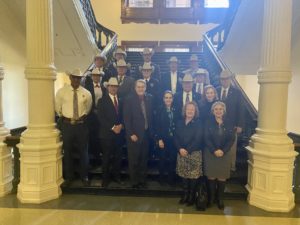
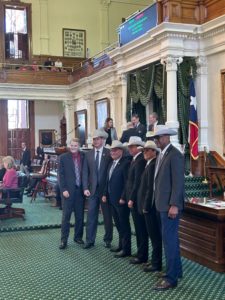
On the Left I am pictured with active and retired Texas Rangers, and their families, and members of the staff of the Texas Ranger Bicentennial. On the right, on the Senate floor, I am pictured with (l:r) Chief Jason Taylor, Lt. Colonel Freeman Martin, Asst. Chief Corey Lain, Captain Wende Wakeman, and Ranger Bradley Freeman.
Recent Capitol Visits from SD-22
My staff and I have been busy meeting with constituents and various interest groups to gain all the needed information for me to make an educated vote on each and every bill on which I may have the opportunity to vote. In the past few weeks, my team and I have been meeting with groups like the Association of General Contractors (AGC) of Texas, the Texas Land and Title Association, Texans for the Arts (which included members from the Waco Cultural Arts Delegation, Tarleton University, and the Granbury Arts Alliance), a large delegation from Texas Electric Cooperative, elected officials from across the district, and many more engaging groups of individuals. We appreciate your visits to the office and the valuable information you share.
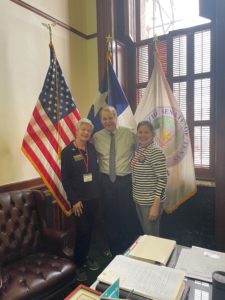
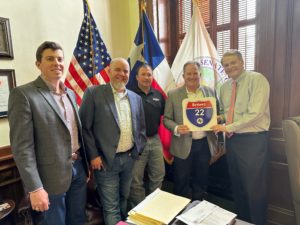
On the top left, I am pictured with McLennan County Republican Women President, Patty Castillo (on my right) and Treasurer, Kathy Endres (on my left); on the top right with a delegation from AGC of Texas; below left with a group from the Texas Land and Title Association; and below right with Erath County Judge Brandon Huckabee.
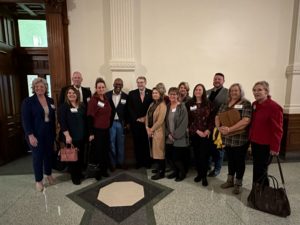
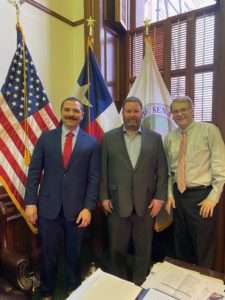
In closing, I want to thank you again for reading this update from ‘Team Birdwell.’ I hope you found it informative and that you’ll share it with your friends, family, and colleagues in Senate District 22, who may subscribe to the Capitol Update by clicking here. And if you missed any of my previous Capitol Updates you can find them here!
God bless,

Brian Birdwell
State Senator, District 22
Austin: (512) 463-0122 // Waco: (254) 776-6225 // Granbury: (817) 573-9622
[email protected] // www.senate.texas.gov
